From Seaside to Mountainside – Sokcho and Seoraksan
By Adam Nash
With all the natural beauty and cultural gems right on Gwangju’s doorstep, traveling to the opposite side of the country for a vacation might sound a tad unnecessary. However, those that make the 470-kilometer trip to Sokcho will not be disappointed. The unique history, geography, and culinary heritage of this bustling port town is well worth the journey.
Located in the northeastern part of Gangwon Province, Sokcho is so far north that it was briefly under the control of North Korea after World War II , before finally changing hands following the Korean Armistice Agreement. These days, it is a popular getaway for those wanting to swap the stifling, summer streets of Seoul for the cool sea breeze of the coast.
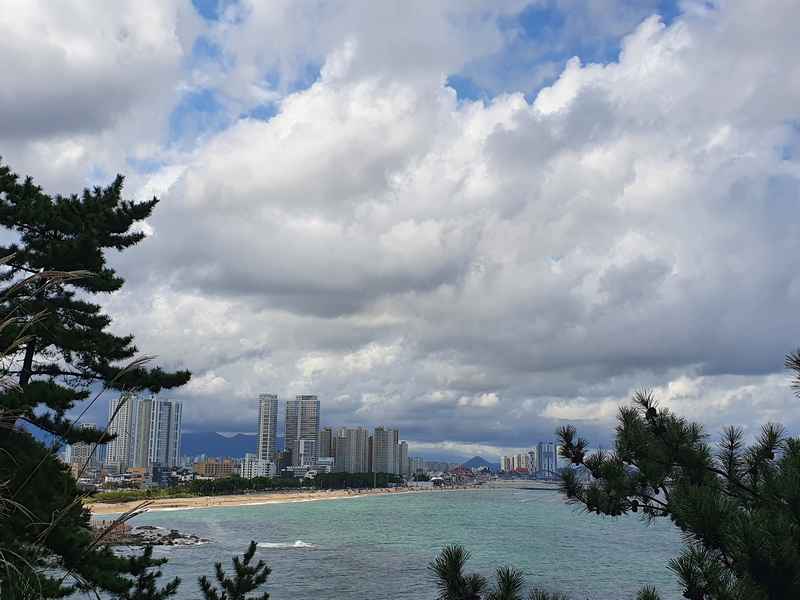
Lounging under a parasol on Sokcho Beach, watching the waves wash onto the shore, is the perfect way to unwind after the long trip. The beach is not exactly a well-kept secret, so I had to share the flat, white sands with the family crowds. Still, I was able to doze off in the fresh sea air and wake up refreshed and rejuvenated.
Sokcho Beach is also said to be an excellent spot to watch the ocean sunrise. Just check the weather forecast before setting your alarm. I learned that the hard way.
Despite the obvious delights of the seaside, I had my eyes set slightly more inland and about 873 meters up to the top of Ulsanbawi (울산바위) or Ulsan Rock.
Seoraksan National Park (설악산국립공원) is known for having one of the most picturesque mountain ranges in the whole of Korea, and for good reason. The striking, six jagged peaks of Ulsan Rock can be seen from the city streets below. The park is also steeped in history, as it was the first area designated as a national park in 1970, and it later received UNESCO recognition as a Biosphere Reserve due to its diverse and colorful ecosystem.
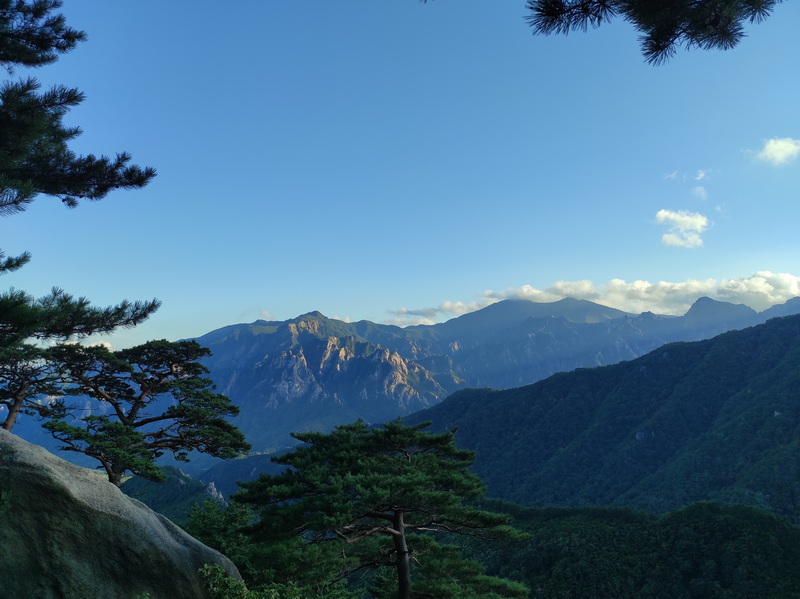
Getting to the national park from Sokcho is easy: just jump on the number 7 or 7-1 bus. Do not do what I did and wake up late, panic, and hail down a taxi. It was a costly mistake, especially as my taxi driver feigned no knowledge of the famous tourist destination and decided to take a pit-stop to ask for directions, all while keeping the meter running.
Once you make it through the exquisitely decorated gate at the park entrance, you will see signs for the cable car. This takes you straight to the ruins of Gwongeumseong (권금성) Fortress at the top of the mountain, ideal for those wanting to enjoy the incredible views without tackling the challenging 7-kilometer hike. But I had not traveled this far just to take the easy way up.
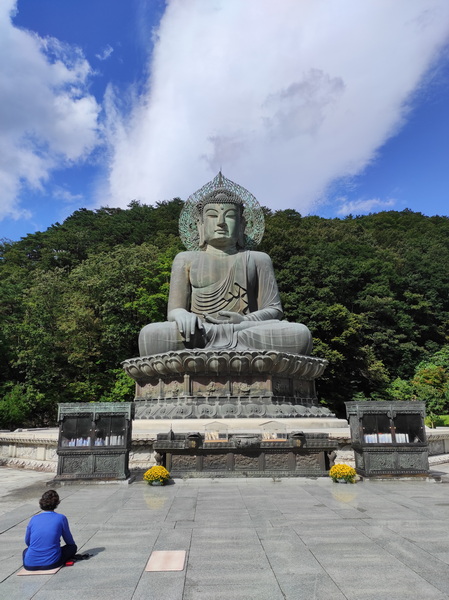
Luckily, just a short walk from the front gate is the stunning Unification Buddha. This 14.6-meter-high bronze statue is set in front of a lush green backdrop at the foothills of the mountain and marks the entrance to the 7th-century Sinheungsa (신흥사) Temple, one of the oldest Zen Buddhist temples in existence.
From here the trail starts off as a gentle, dusty slope running beside a clear mountain stream. Before long, however, the path turns into a rocky track that climbs steeply through the forest. The park is home to over 2,500 different plants and animal species. If you are lucky, you may spot a grazing musk deer or otters playing in the river. Seoraksan is even home to the rare Asiatic black bear. I settled for the sight of a curious chipmunk that followed me along the trail.
Halfway up, I reached a small Buddhist temple nestled in a cave. It is the perfect place to take a break on the rocky ledge and enjoy the stunning views of Seoraksan’s mountain ridges and sunken valleys. Trust me, you will need it.
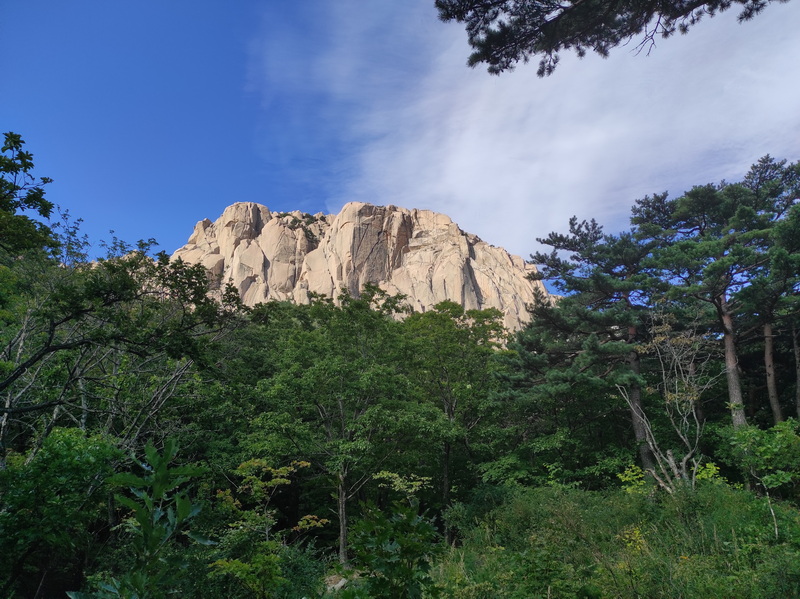
To reach Ulsan Rock, you have to tackle the 800-step staircase that winds its way to the top of the mountain. The hike is a demanding thigh-burner at times, but the end views are truly spectacular. Once standing on the famous granite peaks, I gazed out over Sokcho and across the shimmering sea. This is no serene picnic spot, however, as the strong, howling winds rush in from the sea. It is pretty unnerving, so I shuffled low to the ground and did my best to snap some photos before making the trek back down the mountain.
Back on level ground, it was time to grab some well-earned grub and sample some of the city’s renowned street food. Exploring Korean markets is a favorite pastime of mine, and Sokcho Tourist and Fishery Market is one of the best. Unsurprisingly for a fishing port, there is a dazzling array of sea creatures on display in the tanks between the fruit sellers and souvenir stores. I spent a blissful evening hopping from vendor to vendor, scoffing down all the local delicacies I could find. The city has not one, but two variations on the classic Korean sundae (blood sausage). They first originated from Abai Village, where North Korean refugees replaced the glass noodles with rice. My favorite, however, was the squid sundae, which uses the body of a fresh squid instead of pig intestine. It is a delicious treat, especially after a challenging hike.
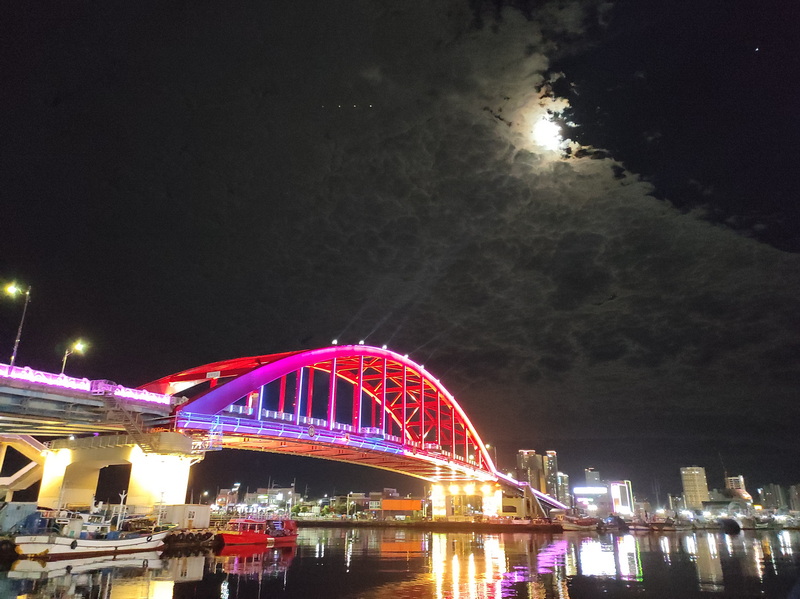
On my final evening, I went for a stroll through a quiet, lakeside park beside the Expo Tower (엑스포타워) and listened to the clinking trawlers at the harborside. I even managed to sneak in a quick drink of locally brewed Craftroot ale at a bar with views of Seorak Bridge before the 10 p.m. curfew cut my night short.
The next day, with legs still aching, it was time to head home. It may be far away, but this little corner of Korea is definitely worth exploring. I have also been told Seoraksan is one of the best places to enjoy the autumn foliage. An excellent excuse for a return visit.
The Author
Adam Nash is a proud Yorkshireman, born and bred in Sheffield, England. He loves traveling, football, and playing music. He has been a drummer for over 20 years but recently picked up the guitar, as a drum kit will not fit in his apartment. Instagram: @adam_nash62.



